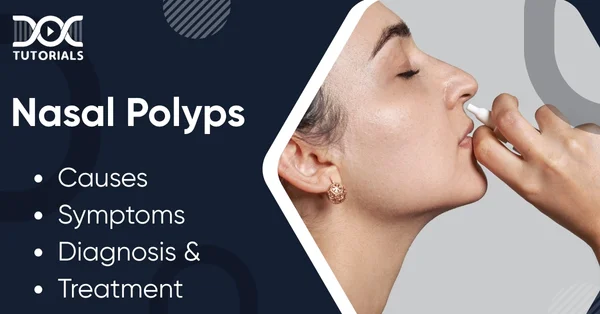Nasal Polyps| Causes, Symptoms, Diagnosis & Treatment Guide

Nasal polyps are soft, noncancerous growths that form on the lining of the nasal passages or sinuses due to chronic inflammation. They often cause breathing difficulties, frequent infections, and a reduced sense of smell, significantly affecting daily life and comfort.
According to the American Academy of Allergy, Asthma & Immunology, nasal polyps affect up to 4% of the population and frequently go undiagnosed. Thus, understanding their causes, symptoms, and treatment options is crucial for effectively managing this common yet often overlooked condition.
Keep reading for in-depth insight!
What are Nasal Polyps?
Nasal polyps are teardrop-shaped bumps that form when the nasal passages or sinuses are inflamed for a long time. They usually happen in groups and are linked to asthma, repeated infections, allergies, medication sensitivities, or problems with the immune system.
The polyps are not malignant and feel soft to the touch. Small nasal polyps may not be visible, but larger ones or those that are grouped together can block the airflow through the nose, leading to breathing issues, frequent infections, and a loss of smell.
What Kinds Of Nasal Polyps Are There?
There are different varieties of nasal polyps, and they are usually grouped by where they come from:
- Polyp in the Ethmoid: These are the most prevalent ones, and they come from the ethmoid sinuses. They commonly occur in both nostrils and are often associated with allergies or long-term inflammation.
- Antrochoanal Polyp: Most of the time, it affects only one side and is more common in younger individuals. These start in the maxillary sinus and go all the way into the nasopharynx.
- Fungal or allergic polyps are linked to allergic fungal sinusitis.
What Makes Nasal Polyps Happen?
It’s not understood what causes nasal polyps, but they typically form when the lining of the nose or sinuses becomes inflamed over a long period. This long-term irritation causes fluid to accumulate in the mucous membrane, leading to the growth of polyps.
Some common conditions that might cause this inflammation are:
- Long-term inflammation of the sinuses is called chronic sinusitis
- Asthma
- Allergic rhinitis, often known as hay fever
- Aspirin allergy
- Cystic fibrosis
- Sinus infections caused by fungi
- Responses from the immune system or genes
In many cases, these elements work together to cause nasal polyps.
What Are The Signs Of Nasal Polyps?
The symptoms of nasal polyps depend on their location and size. Small nasal polyps may not create any symptoms that are easy to see, but larger or more than one polyps might cause long-lasting pain.
Some common signs of nose polyps are:
- Nasal congestion or stuffiness
- Nose running
- Postnasal drip (mucus flowing down the back of the throat)
- Loss of smell or a decreased sense of smell (anosmia)
- Less flavor
- Pain or pressure in the face
- Headaches
- Snoring
- Sinus infections that happen a lot
When polyps are large or numerous, they may block the sinuses, causing pain and pressure. They can also produce rhinolalia clausa, a speech pattern that occurs when the nose is blocked.
What Are The Things That Make Nasal Polyps More Likely To Happen?
There are a number of things that can make it more likely that you will get nasal polyps:
- Chronic Sinus Inflammation: If the nasal passages are always inflamed, it can make you more likely to get sick.
- Asthma: Individuals with asthma are more likely to develop nasal polyps.
- Aspirin Sensitivity: If you are sensitive to aspirin or NSAIDs (non-steroidal anti-inflammatory medicines), your risk may go up.
- Allergies: Conditions such as allergic rhinitis and environmental allergies are common causes.
- Cystic Fibrosis is a genetic illness that makes it difficult for the body to produce mucus, which causes numerous respiratory problems.
- Family History: Genetic factors may be involved in the development of polyps.
- Age: Adults, especially those over 40, are more likely to be impacted.
How Do Doctors Find Out If You Have Nasal Polyps?
If you have symptoms of nasal polyps, a doctor, typically an ENT (ear, nose, and throat) specialist, will begin by conducting a physical examination and inquiring about your medical history. This could include:
- Endoscopy of the Nose
- A thin, flexible tube containing a camera and light is inserted into the nose, allowing the sinuses and nasal passageways to be visualised immediately.
- This lets the ENT doctor find out if there are nasal polyps, how big they are, and where they are.
- A posterior rhinoscopy mirror can also see deeper, especially if there is a blockage suspected in the back of the nasal cavity.
- A thin, flexible tube containing a camera and light is inserted into the nose, allowing the sinuses and nasal passageways to be visualised immediately.
- CT or MRI scans
- Imaging tests that show how big the polyps are, where they are, and if there is any sinus inflammation or damage that goes along with them.
- Imaging also helps rule out other problems with the structure.
- Imaging tests that show how big the polyps are, where they are, and if there is any sinus inflammation or damage that goes along with them.
- Testing for Allergies
- Identifying potential allergens can help address the underlying cause of persistent inflammation that contributes to the development of polyps.
- Identifying potential allergens can help address the underlying cause of persistent inflammation that contributes to the development of polyps.
- Testing for Cystic Fibrosis
- People often suggest testing children with nasal polyps for cystic fibrosis since polyps can be an early symptom of the disease.
- People often suggest testing children with nasal polyps for cystic fibrosis since polyps can be an early symptom of the disease.
- Blopd Test
- This test may be performed to detect immune system issues or long-term inflammatory conditions that could be contributing to the growth of polyps.
- This test may be performed to detect immune system issues or long-term inflammatory conditions that could be contributing to the growth of polyps.
Sometimes, a polyp can look like a growth on the nasal bone, especially when you look at it using imaging or an endoscope. Polyps, on the other hand, are soft, pale, and flexible, which sets them apart from complicated, stiff bone formations.
What Do You Do To Treat Nasal Polyps?
The goal of nasal polyp therapy is to shrink or eliminate them and address the underlying cause so they don’t recur.
Drugs
- Nasal corticosteroids, such as Fluticasone and mometasone, help reduce the size and inflammation of polyps.
- Oral or injectable corticosteroids, such as prednisone, are used when nasal sprays are ineffective or when the condition worsens.
- Antihistamines can assist if allergies are making the inflammation worse.
- Antibiotics: Given when there are bacterial sinus infections.
- Biologics: Newer drugs, such as dupilumab (Dupixent), work by targeting certain immune system pathways to reduce polyps and ease symptoms.
Surgery
Surgery may be needed if drugs don’t work. Endoscopic sinus surgery is the most common type of surgery. It utilises a small camera and specialised tools that are inserted through the nose to remove polyps.
Surgery helps restore airflow and sinus drainage, but it doesn’t permanently resolve the issue. If the irritation that causes the polyps isn’t treated, they will typically recur.
Do Nasal Polyps Cause Any Problems?
Yes, if you don’t cure significant nasal polyps, they can cause a number of problems, such as:
- Obstructive Sleep Apnea: When airways are blocked, it can be hard to sleep and cause other problems.
- Asthma Attacks: Nasal polyps can make asthma symptoms worse or difficult to control.
- Chronic or Recurrent Sinus Infections: Sinuses that are blocked may not drain well.
- Loss of taste or smell: In some long-term situations, this can last forever.
- Changes in the Structure of the Face: In sporadic but severe cases, polyps can exert prolonged pressure on the face.
These hazards can be significantly reduced by seeking treatment promptly and managing it effectively.
FAQs About Nasal Polyps
Do nasal polyps cause cancer?
No, nasal polyps are not carcinogenic. However, if you experience persistent nasal problems, it is recommended that you consult a doctor to rule out any more severe underlying issues.
Do nasal polyps ever go away on their own?
Medication may help small nasal polyps shrink, but they usually don’t disappear completely without the right care and therapy for the inflammation that caused them.
How is posterior rhinoscopy used to find nasal polyps?
A mirror is used in posterior rhinoscopy to see the nasopharynx and the back of the nasal cavity. It helps find deeper polyps or check for posterior extension, especially in situations of antrochoanal polyps.
Are nasal polyps harmful?
Many people worry about whether nasal polyps are harmful. Polyps that aren’t treated can cause long-term infections, trouble breathing, and a big drop in quality of life.
What makes nasal polyps different from normal nasal tissue?
You can tell the difference between nasal polyps and normal tissue by how they look and what they do. Normal tissue allows air and drainage to move freely, but polyps can block breathing and scent due to their size and position.
Conclusion
Understanding nasal polyps is vital for NEET PG aspirants, particularly in the ENT and general medicine sections. DocTutorials offers expertly curated content, engaging video lectures, and concise, high-yield notes to help you grasp the pathology, symptoms, diagnosis, and treatment of nasal polyps with clinical precision.
Enhance your exam preparation with our focused NEET PG modules on nasal polyps. From quick revision tools to case-based discussions, DocTutorials ensures you’re equipped with the knowledge and confidence to tackle related questions effectively and improve your overall performance.
Enrol in our courses today!
Latest Blogs
-

NEET SS Exam 2024: Analysis, Key Dates, Counselling
The NEET SS 2024 exam kicked off on March 29, 2025. Over two days and two slots, candidates across 13…
-

NEET PG Registration 2025: An Essential Guide For Exam Prep
The NEET PG registration, which is conducted online, is a crucial step in the exam process. Filling out the NEET…
-

NEET PG Syllabus 2025: A Must-Have Complete Guide for Exam Success
The NEET PG Syllabus acts as one of the foundation stones for aspiring postgraduate medical students like you who are…




